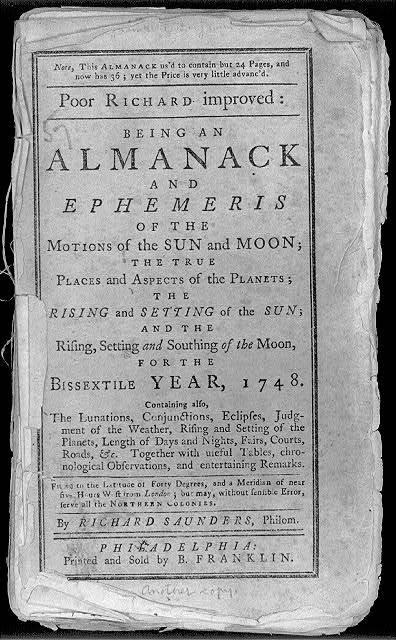On December 28, 1733, Benjamin Franklin, using the pseudonym Richard Saunders, began publishing Poor Richard’s Almanack, which included agricultural predictions, charts of the moon’s phases, and a series of proverbs, such as “haste makes waste.” Franklin, acknowledged as one of America’s Founding Fathers, especially for his role as a statesman, continued to publish his Almanack until 1758.
Share some of the following proverbs taken from Poor Richard’s Almanack with your students:
- There are no gains without pains.
- At the working man’s house, hunger looks in but dares not enter.
- Industry pays debts while despair increases them.
- Plough deep while sluggards sleep and you shall have corn to sell and to keep.
- One today is worth two tomorrows.
- Have you something to do tomorrow? Do it today.
- Trouble springs from idleness and grievous toil from needless ease.
- The noblest question in the world is: What good may I do in it?
- Hear no ill of a friend, nor speak any of an enemy
Ask students to give their impressions of the person who would write these statements. Then, have students choose one saying, paraphrase it, and explain why they agree or disagree with its message. As a final activity, ask students to write their own mottos for life. These mottos can be illustrated and displayed in the classroom or made into bumper stickers or T-shirts.
Read on to learn more about Benjamin Franklin.
Curious about the NCTE and Library of Congress connection? Through a grant announced by NCTE Executive Director Emily Kirkpatrick, NCTE is engaged in ongoing work with the Library of Congress, and “will connect the ELA community with the Library of Congress to expand the use of primary sources in teaching.” Stay tuned for more throughout the year!
It is the policy of NCTE in all publications, including the Literacy & NCTE blog, to provide a forum for the open discussion of ideas concerning the content and the teaching of English and the language arts. Publicity accorded to any particular point of view does not imply endorsement by the Executive Committee, the Board of Directors, the staff, or the membership at large, except in announcements of policy, where such endorsement is clearly specified.

